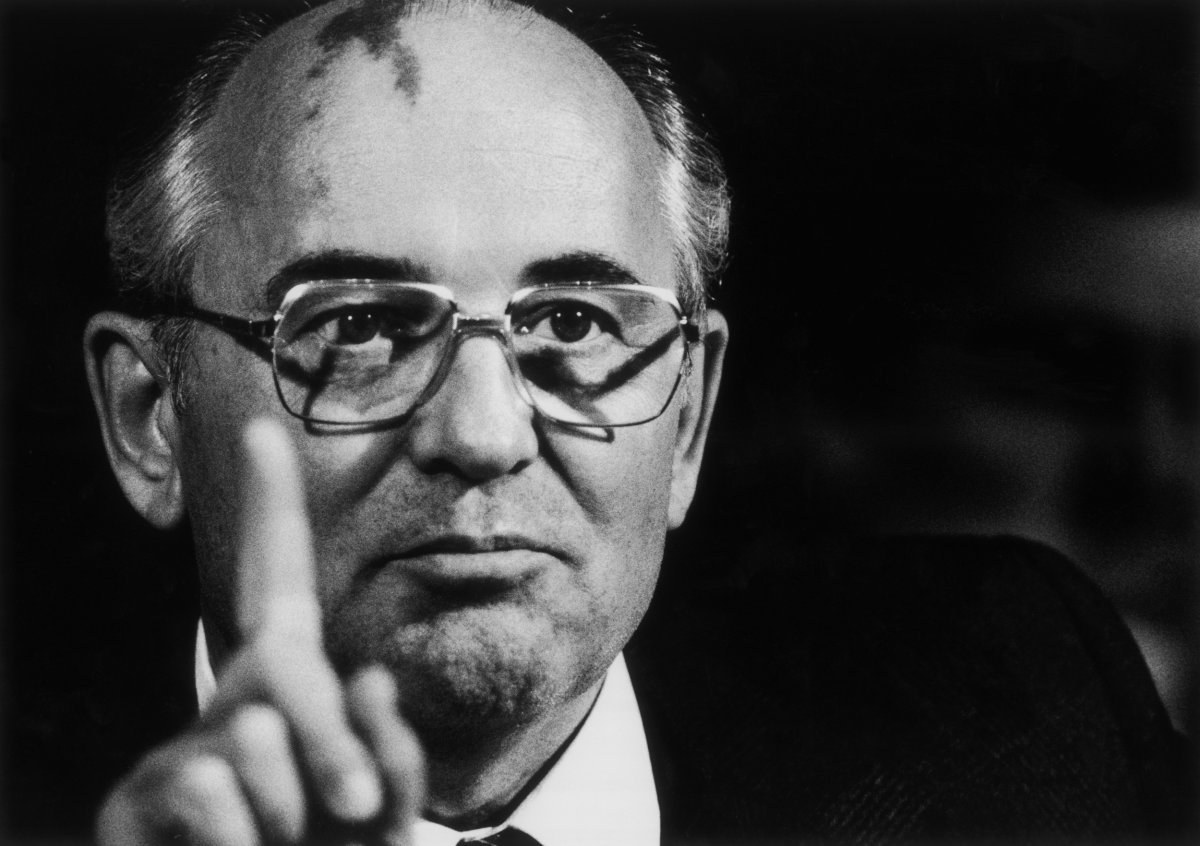In the wake of the death of Mikhail S. Gorbachev, the last leader of the Soviet Union, it is appropriate to discuss his role in perhaps the greatest freedom movement in all Jewish history—the exodus of Soviet Jewry.
Trapped in the USSR for decades, under Gorbachev's watch the Iron Curtain came down, and hundreds of thousands of Jews were allowed to emigrate to Israel, the United States, and elsewhere. Still, for the sake of historical accuracy, it is important not only to assess who he was, but who he was not.
During his quarter-century service to the Soviet state, Gorbachev initiated and participated in the destruction of the rule of law, particularly human rights, under the discredited banner of Communism, an ideology he never disavowed to the end of the Soviet regime. He appointed Valentin Rasputin—who advocated that Russian Jews ought to be tried collectively for the murder of Jesus—to his cabinet; and allowed Pamyat, the notorious anti-Semitic organization, to flourish.

Under Gorbachev, the Kremlin trained Palestinian terrorists, providing them and radical Arab states with weapons of destruction against Israel. Indeed, Gorbachev maintained military "advisors" in Iraq when Saddam launched Soviet-made Scuds against the Jewish state. Israelis—and we and hundreds of young American Jews who bravely flew to Israel during the Persian-Gulf War—will never forget those nights of fear.
And Gorbachev is not, as many maintain, the man who "let the Jews go." During the first years of his rule, the number of Jews exiting plummeted, and key refuseniks such as Ida Nudel and Vladimir Slepak continued to have their exit visas denied. Others, like Yosef Begun, and Yuli Edelstein remained in the Gulag. Only in 1987, a full two years after his rise to power, did Jewish emigration begin in earnest, and even while that exit was taking place, Gorbachev did not condemn the growing anti-Semitism in the Soviet Union fully. He didn't speak out until he was almost out the door himself.
Furthermore, it is inaccurate to credit Gorbachev with the eventual large emigration of the 1980's. The credit for that belongs to those who forced Gorbachev's hand.
The late Sen. Henry Jackson (D-Wa.), who never met Gorbachev, was the engineer of change. Together with Rep. Charles Vanik (D-Ohio), Jackson introduced an amendment in 1973 linking most-favored-nation trade status and trade credits with freer emigration from the Soviet Union. When the USSR crumbled economically, Gorbachev permitted emigration to obtain the credibility and assistance he desperately needed. He was made to understand by the U.S. Congress that the bridges of trade between the U.S. and the Soviet Union were based on the pillars of human rights.
Prisoners of conscience, refuseniks and dissidents, men and women who spent years defying the Kremlin, and/or languishing in Soviet prisons and labor camps—they, too, forced Gorbachev's hand. Professor Andrei Sakharov and other dissidents, such as those monitoring the Helsinki Accords, unwaveringly supported the basic right of free emigration.
Western "students and housewives," to use Natan Sharansky's phrase, in the hundreds of thousands, forced Gorbachev's hand. Countless unheralded indefatigable workers who labored from the beginning to inspire the mass protest movement and expose the human rights abuses of the Soviet Union worked for nothing or a mere pittance; their lives were meshed with those of their sisters and brothers. Unrelenting, they never tired, they never gave up. They were joined by civil rights activists and clergy of other faith communities who bonded with their Jewish brethren, helping American Jewry in achieving one of its greatest post-Holocaust successes.
As activists, we used every opportunity to protest Gorbachev's emigration policies. Most specifically, we were among those who leveraged summits between Gorbachev and President Ronald Reagan to be upfront and personal; to drive home to the Soviet leader the depth of our commitment to free our brethren.
At the November 1985 Geneva summit, Sharansky's indefatigable wife Avital was detained by Swiss police at the door of the USSR's mission. She bore a letter to Gorbachev's wife Raisa: "You are a wife and a mother. Permit me to be a wife and a mother." At the same time, prisoner of conscience Yosef Mendelevich and I (Weiss) sat in at the Geneva Aeroflot office, resulting in our jailing.
In 1987, Natan Sharansky, who had been released a year earlier, crisscrossed the United States to ignite support for a massive, vocal rally for refuseniks and prisoners of conscience. It was a bitterly cold December day on the capital's Mall on the eve of another summit, even drawing Vice President George Bush as a speaker. The next day, Reagan pointed Gorbachev to the coverage that event generated as a reason to press for more human rights in, and emigration from, the USSR. Meanwhile, a group of us staged a sit-down strike in front of the Soviet Embassy, resulting in our arrest.
At the May 1988 Moscow summit, a group of us flew into Moscow. In the middle of Red Square, we pulled out tallitot (Jewish prayer shawls), blew shofars (trumpets made from rams' horns), and held signs for refuseniks and prisoners of conscience. We were protected from the KGB agents who surrounded us by the presence of sympathetic foreign media. We joined a group of refuseniks demonstrating at the Lenin Library. As the KGB attacked our brethren, we were saved by a sympathetic Canadian TV crew who pushed us into their van.
In December 1989, a group of us journeyed to the tiny island of Malta for another summit. We stood yards away from where Gorbachev and his wife exited their limousine. We held high our signs for Soviet Jews' freedom. Raisa looked at our message and nudged her husband. We could clearly see his face dissolving into a frown. Even on this flyspeck in the Mediterranean, the issue of human rights pursued him.
It's important that history not be distorted at its source. Gorbachev was in when Jews got out. But Gorbachev did not, of his own volition, pull the lever to open the doors. It was others, many others, who forced his hand, leaving him little choice but to allow it to happen.
Lionizing Gorbachev for responding under pressure to the righteous demands of world Jewry, is tantamount to ennobling Pharaoh for "letting our people go."
Glenn Richter was the National Coordinator of the Student Struggle for Soviet Jewry from 1964-1991. Avi Weiss, author of Open Up the Iron Door: Memoirs of a Soviet Jewry Activist, was the National Chairman of the SSSJ from 1982-1991.
The views expressed in this article are the author's own.
Uncommon Knowledge
Newsweek is committed to challenging conventional wisdom and finding connections in the search for common ground.
Newsweek is committed to challenging conventional wisdom and finding connections in the search for common ground.
About the writer
To read how Newsweek uses AI as a newsroom tool, Click here.








